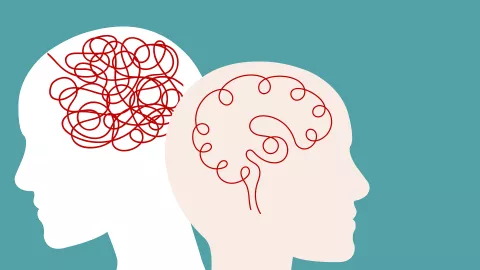Risk factors for mental illnesses
Genetic predisposition
Genetic predisposition plays a fundamental role in the development of mental health disorders. Research suggests that individuals may inherit a predisposition to certain conditions through genetic variations passed down from their parents. These genetic factors can affect the way chemicals in the brain function, impacting mood regulation, stress responses, and overall mental well-being.
Moreover, genetic predisposition can increase an individual’s vulnerability to mental health challenges when coupled with environmental stressors. While having a genetic predisposition does not guarantee the development of a mental health disorder, it can significantly heighten the risk. Understanding the interplay between genetic predisposition and external factors is crucial for early identification, prevention, and targeted interventions to support individuals at risk for mental health issues.
Early childhood trauma
Early childhood trauma refers to any adverse experience that occurs during the formative years of a person’s life, typically between the ages of 0 to 6. These traumatic events can have profound and long-lasting effects on a child’s psychological and emotional development, potentially leading to a variety of mental health issues later in life. Research indicates that individuals who have experienced early childhood trauma may be more susceptible to conditions such as depression, anxiety, and post-traumatic stress disorder.
The impact of early trauma can manifest in a myriad of ways, disrupting normal cognitive and emotional processes. Children who have undergone trauma may struggle with trust, emotional regulation, and forming healthy relationships. Moreover, the effects of early childhood trauma can extend into adulthood, influencing an individual’s ability to cope with stress, manage emotions, and navigate interpersonal dynamics. It is essential for mental health professionals to recognize the significance of early childhood trauma in informing an individual’s mental well-being and provide appropriate support and interventions.
Chronic stress
Chronic stress, characterized by prolonged exposure to challenging life circumstances, can have profound effects on an individual’s physical and mental well-being. The unrelenting pressure and demands that accompany chronic stress can impair cognitive function, disrupt the body’s hormonal balance, and lead to a heightened risk of developing various health issues. Moreover, individuals experiencing chronic stress may find it difficult to relax, leading to a persistent state of tension and elevated levels of anxiety.
The cumulative impact of chronic stress can exacerbate pre-existing mental health conditions and contribute to the development of new ones. Prolonged exposure to stress can alter brain structure and function, increasing vulnerability to mood disorders such as depression and anxiety. Additionally, chronic stress can weaken the immune system, making individuals more susceptible to illnesses and infections. Addressing chronic stress through effective coping strategies and interventions is crucial in mitigating its detrimental effects on overall health and well-being.
Substance abuse
Substance abuse can significantly impact an individual’s mental health by leading to an array of psychological complications. The misuse of drugs or alcohol can exacerbate existing mental health conditions or trigger the onset of new ones, such as anxiety disorders or depression. When a person’s substance abuse becomes chronic, it can impair their ability to regulate emotions and cope with stress effectively, further exacerbating their mental health struggles.
Moreover, substance abuse often creates a vicious cycle where individuals may turn to drugs or alcohol in an attempt to self-medicate their underlying mental health issues. However, instead of providing relief, substance abuse can worsen symptoms and lead to a deterioration in overall well-being. This harmful cycle of self-medication can further perpetuate mental health challenges, making it crucial for individuals struggling with substance abuse to seek comprehensive treatment that addresses both their addiction and underlying mental health concerns.
Family history of mental illness
Individuals with a family history of mental illness are at an increased risk of developing similar conditions themselves. The genetic component of mental health disorders can significantly impact an individual’s susceptibility to various psychiatric conditions. Research suggests that certain genetic factors may predispose some individuals to anxiety disorders, depression, bipolar disorder, or schizophrenia, among others. Consequently, having a family history of mental illness can heighten the likelihood of experiencing similar psychological challenges.
Moreover, the presence of mental health issues within a family can influence the overall understanding and approach to mental well-being. Growing up in an environment where mental illness is prevalent can shape one’s perception of mental health and contribute to stigma or misconceptions surrounding psychological disorders. Family members with mental illnesses may also inadvertently pass on coping mechanisms or behaviors that could exacerbate the risk of developing mental health concerns in susceptible individuals.
Lack of social support
Lack of social support can significantly impact an individual’s mental well-being. Studies have shown that individuals lacking a strong social network are at a higher risk of experiencing loneliness, isolation, and increased levels of stress. The absence of meaningful connections with others can lead to feelings of alienation, which may exacerbate symptoms of depression and anxiety.
Furthermore, navigating life’s challenges without a supportive network can make it harder for individuals to cope with stress and adversity. In times of need, having friends or family members to provide emotional support, guidance, and encouragement can make a profound difference in one’s mental health. Without this crucial support system, individuals may struggle to manage their emotions effectively and may be more susceptible to developing mental health issues.
Traumatic life events
Experiencing traumatic life events can have profound and lasting effects on an individual’s mental health. The impact of such events can manifest in various ways, including symptoms of depression, anxiety, PTSD, and other psychological disorders. Trauma can disrupt a person’s sense of safety and security, leading to feelings of helplessness, vulnerability, and fear.
Individuals who have experienced traumatic events may struggle with intrusive thoughts, flashbacks, and nightmares that can significantly impair their daily functioning. This constant state of heightened alertness can also result in difficulty concentrating, irritability, and emotional dysregulation. Moreover, traumatic life events can erode an individual’s self-esteem and self-worth, making it challenging for them to trust others or form meaningful relationships.
Chronic medical conditions
Individuals with chronic medical conditions often face unique challenges that can significantly impact their mental well-being. The daily struggles and limitations imposed by managing these illnesses can lead to feelings of frustration, hopelessness, and isolation. The constant need for medical care and the uncertainty of their health can also contribute to heightened levels of stress, anxiety, and depression.
Moreover, the physical symptoms associated with chronic medical conditions can worsen mental health symptoms and vice versa, creating a vicious cycle that is difficult to break. Managing both the physical and mental aspects of these conditions requires a comprehensive and holistic approach that addresses the interplay between the two. Additionally, the financial burden of medical treatment and the impact on one’s quality of life can further exacerbate mental health issues for individuals living with chronic medical conditions.
Neurological disorders
Neurological disorders encompass various conditions that affect the brain and nervous system, leading to a wide range of symptoms and functional impairments. These disorders may arise from structural abnormalities, genetic mutations, or disruptions in the communication between nerve cells. Individuals with neurological disorders may experience difficulties with movement, sensation, cognition, or behavior, depending on the specific nature and severity of their condition.
Some common examples of neurological disorders include epilepsy, Alzheimer’s disease, multiple sclerosis, Parkinson’s disease, and stroke. These conditions can have a profound impact on an individual’s quality of life, requiring ongoing medical management and support. Research into the underlying causes and treatment options for neurological disorders is a critical area of study in the field of neuroscience and medicine.
Poor coping mechanisms
Individuals who rely on poor coping mechanisms often struggle to manage stress effectively, resulting in detrimental consequences for their mental health. These individuals may turn to maladaptive behaviors such as substance abuse, avoidance, or denial in an attempt to cope with difficult situations. By avoiding addressing the root causes of their stressors, they inadvertently perpetuate a cycle of negative emotions and distress.
Moreover, individuals with poor coping mechanisms may lack the ability to regulate their emotions or problem-solve effectively. This can lead to heightened levels of anxiety, depression, and emotional instability. Instead of facing challenges head-on and developing healthy coping strategies, individuals with poor coping mechanisms may resort to harmful behaviors that only serve to exacerbate their mental health issues in the long term.
Environmental factors
Environmental factors play a significant role in influencing an individual’s mental health. The surroundings in which a person lives, works, and spends their time can have a profound impact on their psychological well-being. Factors such as air quality, noise levels, access to green spaces, and exposure to toxins can all contribute to the development or exacerbation of mental health conditions.
Moreover, the socio-economic status of an individual can also be considered an environmental factor that affects mental health. Limited access to resources, higher levels of stress due to financial instability, and living in impoverished or unsafe neighborhoods can all contribute to the increased likelihood of experiencing mental health issues. Additionally, the quality of social relationships and the level of support from the community can play a crucial role in promoting mental wellness in individuals.
Brain chemistry imbalance
Numerous individuals grapple with mental health challenges that can often be attributed to an imbalance in brain chemistry. The intricate workings of neurotransmitters and hormones within the brain play a critical role in regulating mood, cognition, and overall emotional well-being. When these delicate chemical processes become disrupted or dysregulated, individuals may experience symptoms of various mental health disorders, such as depression, anxiety, or bipolar disorder.
Imbalances in brain chemistry can stem from a variety of underlying factors, including genetic predisposition, environmental stressors, substance abuse, or even certain medications. These imbalances can lead to a cascade of effects on an individual’s mental health, impacting their ability to function optimally in daily life. Seeking professional guidance and treatment tailored to address these chemical imbalances is crucial in promoting mental wellness and restoring equilibrium within the brain.
Personality traits
Individuals with certain personality traits may be more susceptible to mental health challenges. Traits such as perfectionism, neuroticism, impulsivity, and low self-esteem have been linked to an increased risk of developing various mental health disorders. Those who exhibit characteristics of pessimism, self-criticism, and dependency may also be predisposed to experiencing mental health struggles.
Furthermore, individuals who display traits of introversion, emotional instability, and difficulty in regulating emotions may find it challenging to cope with stressful situations effectively, leading to the development or exacerbation of mental health disorders. Additionally, a lack of resilience and adaptive coping mechanisms in individuals with certain personality traits can further contribute to the manifestation of symptoms related to mental illness.







